Are Journalists Their Brothers’ Keepers?
Dropping Opinion Pages? Gannett Idea Rankles
JSK Fellowships Add 8 from U.S. to 2022-23 Class
Homepage photo: After speaking at the Media Summit of Americas in Los Angeles, Secretary of State Antony Blinken was interviewed by Marcella Baietto, far left, who graduated from Arizona State University’s Cronkite School in 2020, and current Cronkite students Madison Thomas, center, and Andrea Villalobos. (Credit: Deanna Dent/ASU News)
Support Journal-ismsDonations are tax-deductible.
Are Journalists Their Brothers’ Keepers?
When New York Times columnist David Brooks was asked to comment on Thursday’s historic opening House hearing on the Jan. 6 assault on the U.S. Capitol, Brooks complained that “I thought they were a little too parochial in just the way they conceived it all. This is not just happening here. This is happening in countries all around the world. The Republican Party looks a lot like parties in Poland, in Turkey, in Hungary,” Brooks said Friday on the “PBS NewsHour.”
Brooks could have added Latin America. In the same week, the United States hosted a summit of 20 Western Hemisphere nations that excluded Cuba, Nicaragua and Venezuela because of their hostility toward democracy, especially a free press.
When Mexican President Andrés Manuel López Obrador and others objected to the exclusion, the main narrative in the U.S. media became whether the summit would succeed. True, that was one part of the story. But there was also the diminishing ability of those reporters to practice journalism in Latin America, as they could in a true democracy.
Not only was that downplayed, but one “progressive” program, ironically titled “Democracy Now,” took the occasion to interview a journalist who sneered that “the absence of so many Latin American countries represents a decline in U.S. hegemony.” Its headline highlighted the words “Global Embarrassment.”
Noting that the “countries’ leaders are not here, but their many vocal opponents are — among them artists, journalists and activists,” another reporter wrote gingerly that it was the Biden administration that “has cast” these countries as “undemocratic dictatorships.”
The Washington Post characterized the issue Friday as “an international spat over democracy.“
 In April, at a discussion of foreign correspondents and news coverage, Rosental Alves (pictured), a veteran Brazilian journalist who holds the Knight Chair in Journalism at the University of Texas at Austin and focuses on Latin America, told the Journal-isms Roundtable that “the most important story that’s not being covered enough here is the gross threat against democracy in the region . . . We have been spending our lives looking at Latin America as what took place [with] military coups, etc.
In April, at a discussion of foreign correspondents and news coverage, Rosental Alves (pictured), a veteran Brazilian journalist who holds the Knight Chair in Journalism at the University of Texas at Austin and focuses on Latin America, told the Journal-isms Roundtable that “the most important story that’s not being covered enough here is the gross threat against democracy in the region . . . We have been spending our lives looking at Latin America as what took place [with] military coups, etc.
“And now you have [Brazilian President Jair] Bolsonaro in Brazil, who is covered more, but we have the case of Central America that is brutal! I mean the case of Nicaragua, for example, what is happening in journalism there,” and because of crackdowns on the press, “how it is not possible to cover, even when the American press want to cover.” Alves mentioned Brazil and El Salvador as additional danger zones for democracy.
In an August 2021 event at the National Press Club sponsored by press-freedom groups and the National Press Club Freedom Committee, journalists from Nicaragua, Cuba and Venezuela described the harassment their colleagues endured and demanded the release of detained journalists. (Credit: YouTube)
Alves spoke shortly after World Press Freedom Day, when Reporters Without Borders noted, “Distrust of the press, fueled by anti-media rhetoric and the trivialisation of politicians’ stigmatising discourse – especially in Brazil (ranked 110th in the Index), Cuba (173rd), Venezuela (159th), Nicaragua (160th), and El Salvador (112th) – has gained ground.” That’s among 180 countries and territories.
“Increasingly visible and virulent, these public attacks weaken the profession and encourage abusive legal action, smear and intimidation campaigns – especially against women – and online harassment of critical journalists,” RSF said.
Who was standing up for democracy? As it turns out, Secretary of State Antony Blinken, who as the summit began, issued a strong statement in defense of journalists in Latin America that went largely unreported in the United States, where the focus was on the backlash from Mexico and others.
“No region in the world is more dangerous for journalists,” Blinken said Tuesday at a Media Summit of Americas session, “A Commitment to Journalistic Freedom,” organized with Arizona State University’s Cronkite School of Journalism, USC’s Annenberg School of Journalism and the Latino-focused Equis Institute.
“Crimes like these persist in no small part because the people who order them and carry them out are so rarely held accountable,” continued Blinken, who described himself as a “a one-time aspiring journalist myself.” “That sends a message that these attacks can continue with impunity.
“Repressive officials are also using new technologies to monitor journalists, to surveil their private communications – a practice unearthed, fittingly enough, through very dogged reporting.
“Governments are using sweeping legislation to quash free expression, as we saw in the recent slate of amendments adopted by El Salvador in March and in April of this year.
“In Cuba, Nicaragua, Venezuela, the simple act of carrying out investigative journalism is a crime.
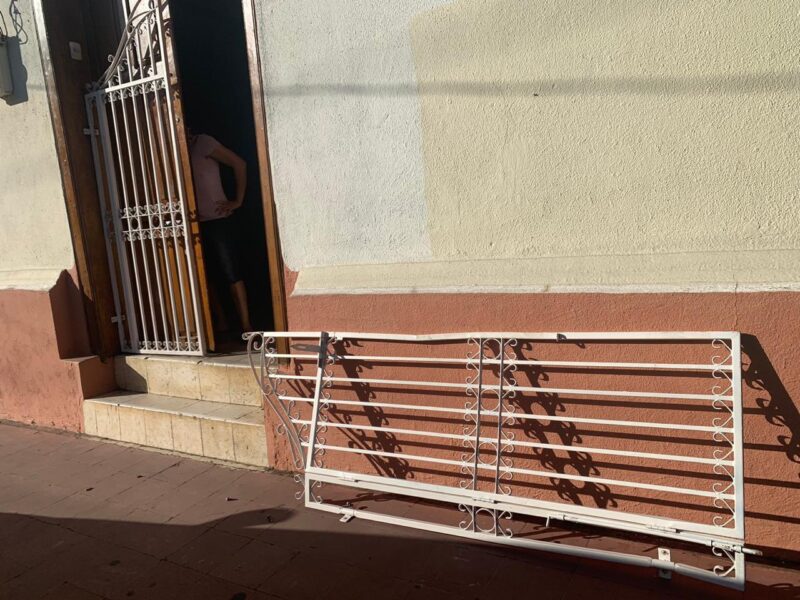
“In Nicaragua, journalists and political opposition candidates Miguel Mora and Miguel Mendoza, newspaper publisher Juan Lorenzo Holmann are currently unjustly imprisoned, after being sentenced under abusive legislation in trials that lacked basic due process. Dozens of independent journalists have fled the country due to persecution and threats, including Aníbal Toruño, Luis Chavarria Galeano, [and] Jackson Orozco, who are with us this week at the summit.
“In Cuba, independent journalists are subjected to systemic abuses, including house arrest for days, weeks at a time, beatings, forced exile. . . .”
Blinken announced steps to counter disinformation and support independent media in the region.
Among them:
- “Today, the United States is launching the first hub of the Digital Communication Network of the Americas. Since creating the DCN in 2015, we’ve actually helped build a network of more than 8,000 journalists, educators, communicators and new media professionals, public officials and others around the world, who are working to combat state-sponsored disinformation and propaganda. The network does this by developing and sharing evidence-based tools to help local actors provide people with accurate information.
- ”“The United States is working across the region to strengthen the rule of law, investing in training judges and prosecutors to investigate and prosecute such attacks, as well as those on human rights defenders and other civil society leaders.
- “We consistently speak up and speak out about attacks on journalists, in every country, in public and in private. We document governments’ efforts to curtail freedom of expression in our annual human rights report.
- “We’re deepening our engagement with multilateral bodies that advocate for freedom of expression and the safety of journalists around the world, using our seat at the table to try to make them even more effective. . . . We’re very proud to join the new OAS [Organization of American States] Group of Friends of Freedom of Expression and Journalism and we welcome the creation of the OAS’s new Center for Media Integrity.
- “USAID [U.S. Agency for International Development] will provide up to $9 million to support a global Defamation Defense Fund for Journalists, which will offer liability coverage for journalists and news organizations targeted with unjust litigation. . . .
- “The State Department is investing up to $3.5 million to launch a Journalism Protection Platform that will provide at-risk media professionals with physical and digital security training, psychosocial care, and other assistance when they are in one way or another under attack. . . .”
- “The United States is working with business groups, with the private sector, to help independent media become more financially sustainable. We’re providing direct financial assistance to at-risk outlets. We’ve committed $30 million to the International Fund for Public Interest Media, which will focus on assisting media in resource-poor and unstable settings, and $5 million to improve the financial viability of independent media outlets. . . .”
Students who questioned Blinken were right to question which countries were being targeted. What about repression in Haiti? one asked. Or autocrats elsewhere?
In the end, the media drama about whether the absence of the leaders of Venezuela, Cuba and Nicaragua would threaten attempts to address migrant crises proved to be overstated.
“The United States is committing $314 million to assist countries hosting refugees and migrants, and is resuming or expanding efforts to reunite Haitian and Cuban families,” Elliot Spagat and Chris Megerian reported Friday for the Associated Press. “Belize will ‘regularize’ Central American and Caribbean migrants in the country.”
Spagat and Megerian also wrote, “The White House highlighted measures that were recently announced and some new commitments. Costa Rica will extend protections for Cubans, Nicaraguans and Venezuelans who arrived before March 2020. Mexico will add temporary worker visas for up to 20,000 Guatemalans a year.”
“ ‘Each of us is signing up to commitments that recognize the challenges that we all share,’ [President] Biden said on a podium with flags for the 20 countries that joined the accord, extending from Chile in the south to Canada in the north.
“ ‘This is just a start,’ Biden said, expressing hope that more countries join. ‘Much more work remains, to state the obvious.’ “
- Congresso em Foco, Brazil: President Bolsonaro is ordered to pay R$100,000 [USD 20,400] for attacks on journalists
- Mary Beth Faller, ASU News, Arizona State University: US secretary of state emphasizes value of a free press at ASU-hosted event
- Kate Linthicum, Los Angeles Times: As El Salvador’s president tries to silence free press, journalist brothers expose his ties to street gangs
- Oscar Lopez, New York Times: Mexico President Will Not Attend Americas Summit in Blow to Biden
- Rebecca Morin, USA Today: Menendez: Mexico’s president tried to ‘blackmail’ Biden to invite ‘dictators’ to Americas summit
- Uyunkar Domingo Peas Nampichkai with Amy Goodman, Indigenous Amazon Leader, Excluded from Summit of Americas, Urges Leaders to Protect Rainforest
- Katherine Pennacchio, LatAm Journalism Review: Women journalists in authoritarian contexts face different challenges than their male colleagues when practicing journalism
- Nelson Rauda, ProPublica: The High Price of Doing Journalism in El Salvador (Nov. 9, 2021)
- Michael D. Shear, New York Times: Despite snubs, Harris works on rounding up investment for Latin America.
- Tracy Wilkinson, Los Angeles Times: Blinken defends exclusion of Cuba from Summit of the Americas, despite triggering boycotts
- Tracy Wilkinson, Los Angeles Times: Cuba, Nicaragua, Venezuela are not at the Summit of the Americas — but their dissidents are
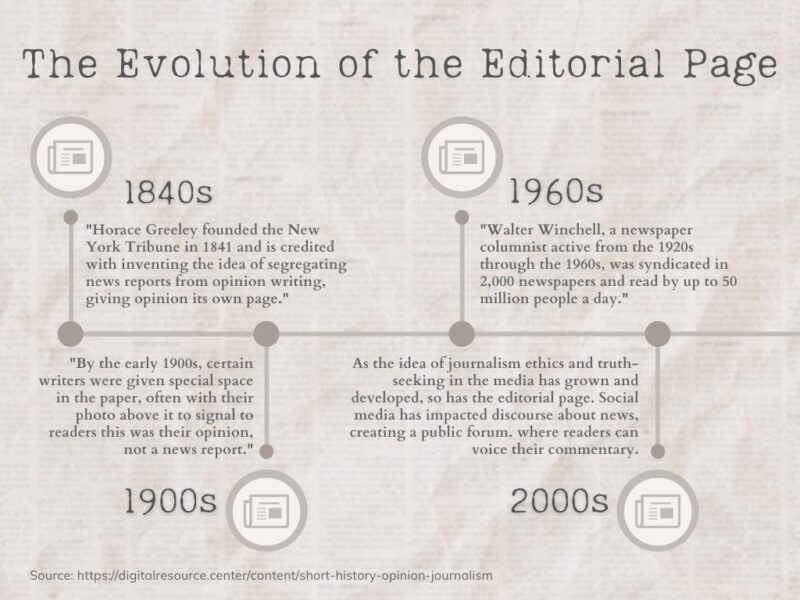
Dropping Opinion Pages? Gannett Idea Rankles
Reports of a nuanced recommendation by Gannett — the nation’s largest newspaper company — that its properties scale back on opinion pages are rubbing some in the opinion journalism business the wrong way.
The American Press Institute Wednesday summarized an account by Rick Edmonds of the Poynter Institute this way:
“Gannett has announced that it will encourage papers to cut back opinion pages to a few days a week, and refocus those opinion pieces on local community dialogue, writes Rick Edmonds. Some Gannett papers, including The Tennessean and the Milwaukee Journal Sentinel have been experimenting with similar ideas for years, but it was a series of reader surveys and a task force of editors that persuaded executives to make the chain-wide shift.
“From the surveys, Gannett found that readers did not ‘want to be lectured at or told what to think,’ and that syndicated columns and pieces on national issues were not appealing to readers at the local level. A Gannett executive said that the new opinion program is a ‘strong suggestion’ rather than an edict; some editors have criticized the move as a cost-cutting measure.”
In The Washington Post Thursday, Meryl Kornfield and Paul Farhi wrote, “So newspapers owned by Gannett Co. — publisher of USA Today and more than 250 dailies — have begun to radically shrink and reimagine their editorial sections, publishing them on fewer days each week and dropping traditional features such as syndicated columns and editorial cartoons. Even political endorsements and letters to the editor are being scaled back. . . .”
Journal-isms asked some current and former editorial page editors their thoughts. A common theme was a denial that their pages “tell people what to think.” or “lecture” them. “They are supposed to encourage readers TO think,” said one. But another said, “I’m guessing that what too many readers really want is to have their viewpoint validated. They would rather be told nothing than be told that they might be wrong.”
Here are other views:
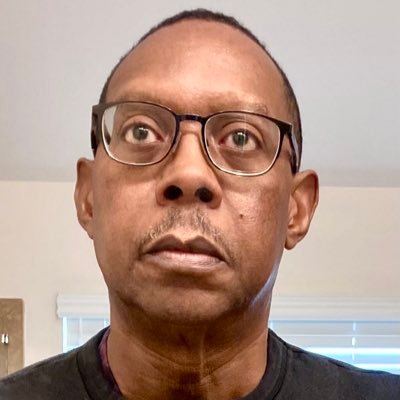 Harold Jackson (pictured), formerly of the Philadelphia Inquirer and later the Houston Chronicle, said, “The Gannett decision even if based on readership data that it says it collected is the wrong answer. If we have learned anything in advancing digital-first approaches to journalism, it is that our audiences crave opinion even as they deny it.
Harold Jackson (pictured), formerly of the Philadelphia Inquirer and later the Houston Chronicle, said, “The Gannett decision even if based on readership data that it says it collected is the wrong answer. If we have learned anything in advancing digital-first approaches to journalism, it is that our audiences crave opinion even as they deny it.
“They mostly love opinions they agree with but also enjoy criticizing those they abhor. The more opinions, the better, especially when they represent diverse points of view from myriad perspectives. A very specific tragedy likely to result from the Gannett decision is the silencing of minority voices losing the megaphones its opinion pages had provided them. I speak as someone who spent the bulk of my 45 years in journalism as an opinion writer and editor, including 10 as editorial page editor of the Philadelphia Inquirer.”
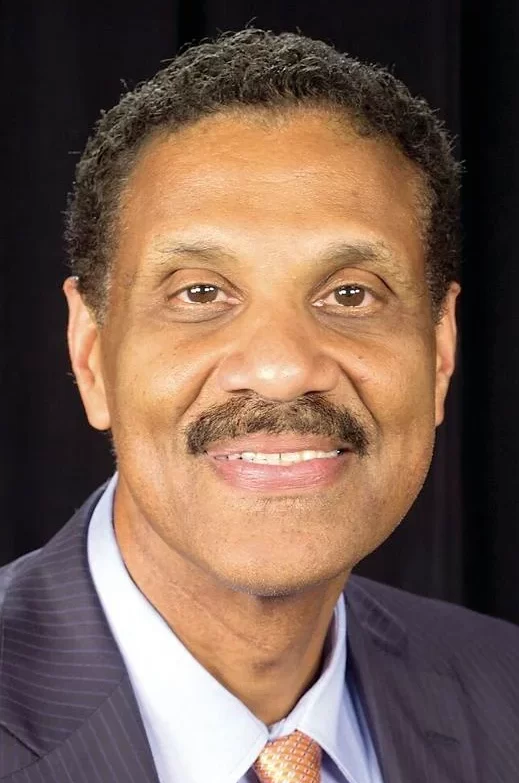 Allen H. Johnson III (pictured), executive editorial page editor of North Carolina’s Greensboro News and Record and Winston-Salem Journal, replied, “This shouldn’t be an either/or proposition. It should be both.
Allen H. Johnson III (pictured), executive editorial page editor of North Carolina’s Greensboro News and Record and Winston-Salem Journal, replied, “This shouldn’t be an either/or proposition. It should be both.
“If anything, we need civil places for fact-based discussion and analysis – and strong editorial voices — now more than ever.
“I’ve seen over my career the role fair, accurate and hard-hitting editorials can play in keeping local and state officials accountable. Effective opinion sections also provide safe places for diverse opinions. In addition to what we publish, we’ve held community forums and experimented with a community editorial board. But there’s a place for syndicated columns as well, and ours have strong local followings. (As one example, whenever Leonard Pitts Jr. comes to town for an in-person event, he fills the house.)
“I don’t knock the notion of providing more opportunities for community dialogue, which we strive to do anyway, but this ought to be in addition to the other things we do, not in place of them.
“Of course, the bedrock of all these efforts has to be a commitment to – and an investment in – local news reporting.”
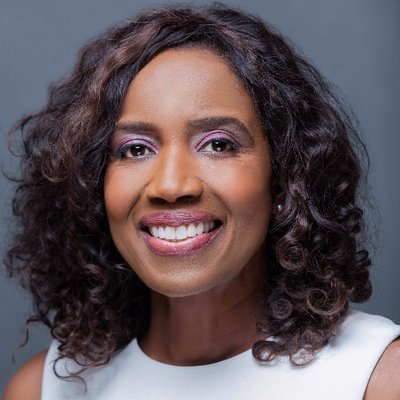 Nancy Ancrum, editorial page editor of the Miami Herald, messaged, “It’s a shame — and a disservice — that Gannett doesn’t see opinion journalism as the powerhouse that it can be — and that it is. It is wholly compatible with community voices, not at odds with them. Local readers crave informed opinion on local issues. We are not telling readers what to think, but what they should factor into their own thinking. That’s what editorial boards provide, and it’s a rare commodity these days. Sadly, it just got rarer.”
Nancy Ancrum, editorial page editor of the Miami Herald, messaged, “It’s a shame — and a disservice — that Gannett doesn’t see opinion journalism as the powerhouse that it can be — and that it is. It is wholly compatible with community voices, not at odds with them. Local readers crave informed opinion on local issues. We are not telling readers what to think, but what they should factor into their own thinking. That’s what editorial boards provide, and it’s a rare commodity these days. Sadly, it just got rarer.”
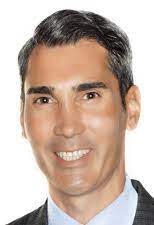 David Plazas (pictured), director of opinion and engagement of The Tennessean in Nashville, wrote his opinion-writing colleagues, “As The Tennessean was mentioned in the article, I’m happy to talk with you about how we are still very actively doing opinion journalism. We are still publishing op-eds, staff columns and editorials. As of this month, we only are doing opinion in print on Sundays, but it’s our premiere section, and we are publishing opinion digitally every day. We also have three opinion newsletters, a video podcast and events. Our audience is increasingly digital.
David Plazas (pictured), director of opinion and engagement of The Tennessean in Nashville, wrote his opinion-writing colleagues, “As The Tennessean was mentioned in the article, I’m happy to talk with you about how we are still very actively doing opinion journalism. We are still publishing op-eds, staff columns and editorials. As of this month, we only are doing opinion in print on Sundays, but it’s our premiere section, and we are publishing opinion digitally every day. We also have three opinion newsletters, a video podcast and events. Our audience is increasingly digital.
“Recently, we solicited more than a dozen op-eds on education finance reform and also published an editorial expressing our perspective on the issue.
“I can attest that opinion editors across the Gannett network communicate daily to share ideas and columns.
“This will be a local decision for publications, but to paint every publication with one brush does not accurately reflect what has happened.”
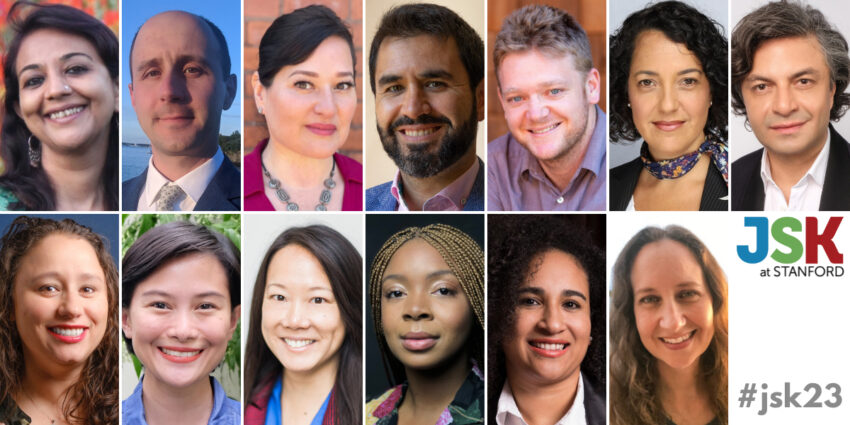
“We learned so much from these two years piloting a new model of remote JSK Community Impact Fellowships and the fellows made great progress with their on-the-ground projects to listen, learn and serve the information needs of their local communities of color,” director Dawn Garcia said.
JSK Fellowships Add 8 from U.S. to 2002-23 Class
The John S. Knight Journalism Fellowships at Stanford University named eight U.S. fellows to join the five international fellows previously announced for the class of 2022-2023, the program announced on May 19.
“It is the first cohort to return to a residential fellowship program on the Stanford University campus since the start of the pandemic.
“The U.S. fellows are veteran and emerging journalism leaders who will work on practical solutions to address the industry’s long-standing neglect of underserved communities. Their projects will address news and information gaps, systemic racism and the deterioration of legacy local news outlets.”
The U.S. fellows are Alex Goldmark, executive producer, NPR, New York; Martina Guzmán, race and justice journalist, Detroit; Jake Nicol, independent video journalist, San Francisco; Luisa Ortiz Pérez, executive director, Vita-Activa.org, Montclair, N.J.; Michelle Faust Raghavan, equity initiative manager, Solutions Journalism Network, Portland, Ore.; Vinnee Tong, managing editor and director of news, KQED, San Francisco; Keiona Williamson, founder, DRIP Espresso, Sacramento, Calif.; and Alicia Zuckerman, editorial director/executive editor of on-demand audio, WLRN, Miami.
To subscribe at no cost, please send an email to journal-isms+subscribe@groups.io and say who you are.
Facebook users: “Like” “Richard Prince’s Journal-isms” on Facebook.
Follow Richard Prince on Twitter @princeeditor
Richard Prince’s Journal-isms originates from Washington. It began in print before most of us knew what the internet was, and it would like to be referred to as a “column.” Any views expressed in the column are those of the person or organization quoted and not those of any other entity. Send tips, comments and concerns to Richard Prince at journal-isms+owner@
View previous columns (after Feb. 13, 2016).
View previous columns (before Feb. 13, 2016)
- Diversity’s Greatest Hits, 2018 (Jan. 4, 2019)
- Book Notes: Is Taking a Knee Really All That? (Dec. 20, 2018)
- Book Notes: Challenging ’45’ and Proudly Telling the Story (Dec. 18, 2018)
- Book Notes: Get Down With the Legends! (Dec. 11, 2018)
- Journalist Richard Prince w/Joe Madison (Sirius XM, April 18, 2018) (podcast)
- Richard Prince (journalist) (Wikipedia entry)
- February 2018 Podcast: Richard “Dick” Prince on the need for newsroom diversity (Gabriel Greschler, Student Press Law Center, Feb. 26, 2018)
- Diversity’s Greatest Hits, 2017 — Where Will They Take Us in the Year Ahead?
- Book Notes: Best Sellers, Uncovered Treasures, Overlooked History (Dec. 19, 2017)
- An advocate for diversity in the media is still pressing for representation, (Courtland Milloy, Washington Post, Nov. 28, 2017)
- Morgan Global Journalism Review: Journal-isms Journeys On (Aug. 31, 2017)
- Diversity’s Greatest Hits, 2016
- Book Notes: 16 Writers Dish About ‘Chelle,’ the First Lady
- Book Notes: From Coretta to Barack, and in Search of the Godfather
- Journal-isms’ Richard Prince Wants Your Ideas (FishbowlDC, Feb. 26, 2016)
- “JOURNAL-ISMS” IS LATEST TO BEAR BRUNT OF INDUSTRY’S ECONOMIC WOES (Feb. 19, 2016)
- Richard Prince with Charlayne Hunter-Gault, “PBS NewsHour,” “What stagnant diversity means for America’s newsrooms” (Dec. 15, 2015)
- Book Notes: Journalists Follow Their Passions
- Book Notes: Journalists Who Rocked Their World
- Book Notes: Hands Up! Read This!
- Book Notes: New Cosby Bio Looks Like a Best-Seller
- Journo-diversity advocate turns attention to Ezra Klein project (Erik Wemple, Washington Post, March 5, 2014)
Page view count was 487 at 9:15 on June 18, 2022.

